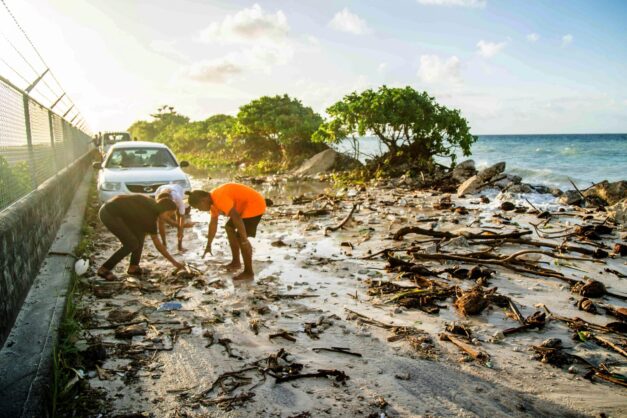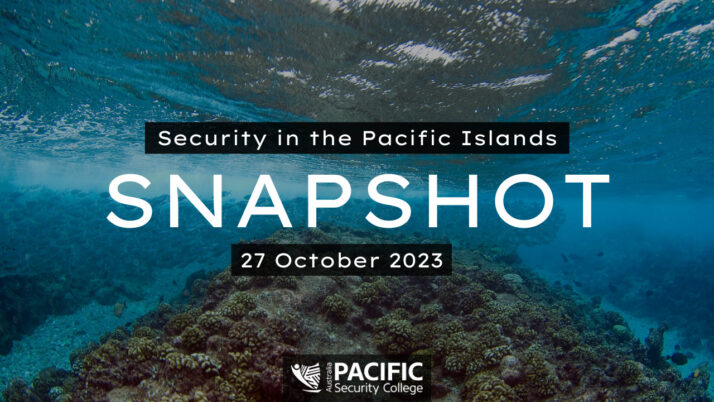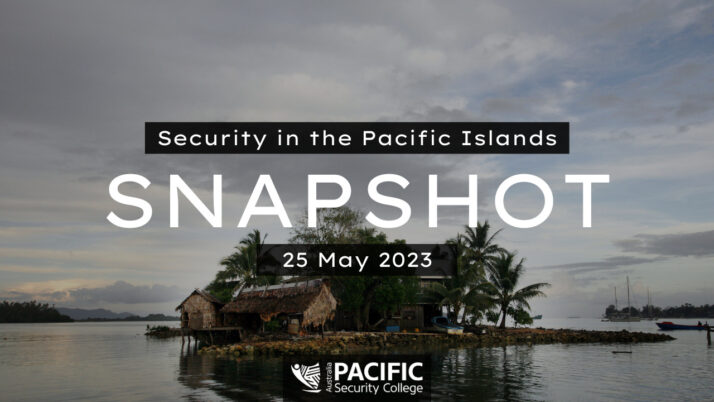Climate change and the future of the United States-Marshall Islands relationship

A photo taken on December 6, 2021 shows high-tide flooding and debris covering the road to the airport in the Marshall Islands capital Majuro. Photo: Chewy Lin / AFP
The United States should renew its Compact of Free Association with Marshall Islands and do more to tackle climate change if it hopes to atone for historical injustices and counter China’s influence, Laura Brewington writes.
Pacific Island states like the Republic of the Marshall Islands (RMI) are among the first impacted by climate change. This not only threatens public safety, livelihoods, and cultural practices, but can also exacerbate the effects of economic inequality.
Under-employment and inequality are major issues in the RMI, which is heavily reliant on foreign financial aid, and as a result there is already substantial migration out of the country as people seek better opportunities. Moreover, the impacts of climate change are expected to accelerate population movements throughout the region.
For the RMI, its Compact of Free Association (COFA) with the United States offers some potential solutions, and lessons for other Pacific development partners. An outcome of the post-World War II American administration of RMI and extensive nuclear testing, the current COFA was first signed between the two nations in 1986. Under the agreement, the United States is responsible for the island nation’s defence and security, and agreed to provide financial assistance and compensation for damages.
The COFA also allows Marshallese citizens to freely live and work in the United States, where a large diaspora now resides. This allows RMI citizens to acquire education and skills that can be utilised on their return home, and many earn money overseas that is sent home in the form of remittances.
However, the impacts of climate change are causing some to question if they should return home. A recent survey of Marshallese living in the United States reported that 62 per cent said that the impacts of climate change in the RMI would negatively affect their decision to go back.
The COFA expires in 2023, at which point the RMI is expected to use earnings from the Compact Trust Fund (CTF) as an ongoing source of revenue. However, there are concerns over whether this fund will be enough to alleviate the ongoing poverty that is prevalent in the country, with many anticipating serious negative effects from a discontinuation of the agreement.
Of the three compact treaties the United States has in Micronesia, the RMI’s is the most complex, and yet there have been no formal COFA meetings between the nations in over two years. Against this backdrop of inaction, climate change, inequality, and COVID-19 also pose existential threats to lives and livelihoods.
It is no surprise, therefore, that a recent draft report by the Asian Development Bank (ADB) predicts substantial increases in out-migration from the RMI if the COFA is not renewed.
In the study, they compared the economic impacts of COFA non-renewal to two alternative renewal scenarios – a 20-year continuation of current levels of support, and a ‘better results’ scenario that introduces additional commitments to policy reform and donor support.
Under the non-renewal scenario, gross domestic product (GDP) is expected to reduce by 4.4 per cent with an associated increase in outbound migration of 6.4 per cent. The ‘better results’ scenario, on the other hand, sees a 0.8 per cent increase in GDP and an overall reduction in migration out of RMI.
It is important to note that the report does not take the impacts of climate change into account. In a nation like the RMI where climate disasters like drought and flooding have already led to relocations, it is possible that deteriorating environmental conditions could erase any economic or migration gains from policy adjustments. This reinforces the need – as former RMI President Hilda Heine has argued – for policies that allow island nations to adapt to climate change, so that migration is a choice and not a foregone conclusion.
In addition to the likely economic impacts of the COFA, the United States also has a moral obligation to the RMI given its history of conducting nuclear tests in the country. Between 1946 and 1958, the United States conducted 67 nuclear tests in RMI’s Bikini and Enewetak Atolls, doing irrevocable environmental and cultural damage in the process.
Moreover, as sea levels continue to rise due to global climate change, American nuclear waste stored within ageing Runit Dome threatens to be released into the surrounding ocean. This is yet another reason the RMI should hold the United States accountable for ongoing damages in the form of a renewed COFA agreement.
A failure to renew the COFA agreement could also significantly damage the efforts of the United States and its allies to compete with China for influence in the Pacific. For now, the RMI remains strategically aligned with the United States and its position on China; however, under a non-renewal scenario, the RMI could look elsewhere for support.
The Chinese Government would likely be more than willing to fill this vacuum, as recently shown by Chinese Foreign Minister Wang Yi’s whirlwind trip to 10 Pacific Island nations in May and June 2022.
Beyond renewing the COFA, the United States should go further in tackling the greatest threat to the RMI’s existence – climate change. Region-wide, Pacific Island nations are insisting that countries like the United States and Australia take bold steps to curb greenhouse gas emissions and address the outsized impacts their actions have had on the islands’ uncertain futures.
If the United States and its allies wish to blunt China’s influence, they must uphold their commitments to keep climate warming below 1.5 degrees Celsius, plan for climate-induced displacement, and implement financing and development mechanisms that ensure a better future for island nations.
Laura Brewington
This piece was first published on Policy Forum.
More Stories

Security Snapshot - 27 Oct 2023
Pacific Security Snapshot | 27 October 2023
The security stories shaping the region Fiji Prime Minister Rabuka promotes Pacific “Zone of Peace” Fiji-Australia Memorandum of Understanding on Cyber Security Cooperation Papua New Guinea and China hold bilateral talks United States and Marshall Islands renew COFA Vanuatu, Samoa and Fiji receive Japanese human security support Pacific Islands Forum releases Loss and Damage Policy…

Security Snapshot - 26 May 2023
Pacific Security Snapshot | 25 May 2023
The security stories shaping the region ➣ Papua New Guinea and the United States sign Defence Cooperation Agreement ➣ United States-Pacific Islands Forum Dialogue held in Port Moresby ➣ Pacific leaders meet Indian Prime Minister Narendra Modi ➣ Pacific call for climate finance breakthrough at UN session ➣ Tuvalu strengthens efforts against illegal, unreported and…






